Quick Summary:
Discover how AI chatbots are transforming healthcare by improving patient care, streamlining operations, and addressing rising demands. This blog will discuss the overall impact and potential of AI chatbots in the healthcare sector.
In this blog, we’re going to discuss📝
Artificial Intelligence (AI) is transforming healthcare, and one of the most promising innovations in this space is AI-powered chatbots. These advanced conversational platforms are enhancing patient experiences, optimizing administrative tasks, and streamlining healthcare delivery. As per AWS Marketplace, the healthcare chatbots market is expected to reach USD 431.47 Million by the year 2028.
From answering patient queries to supporting complex decision-making, AI chatbots are revolutionizing the healthcare sector. In this article, we’ll explore how to build AI-powered, healthcare-focused conversational platforms, detailing their role, benefits, challenges, and future potential.
Introduction to AI Chatbots in Healthcare
AI chatbots are software applications powered by artificial intelligence and natural language processing (NLP) that can simulate human-like conversations with users. In healthcare, chatbots are being deployed to enhance the accessibility, efficiency, and effectiveness of healthcare services.
These chatbots can be integrated into websites, mobile apps, or healthcare platforms to interact with patients, healthcare providers, and administrative staff in real time.
The Growing Need for AI Chatbots in Healthcare
The demand for AI chatbots in healthcare arises from several key challenges in the sector, including:

- Increased Patient Load: Healthcare systems worldwide are facing growing patient volumes, with an increased need to deliver quality care in a timely manner.
- Cost and Efficiency Concerns: Healthcare organizations are looking for cost-effective solutions to optimize resources and reduce operational inefficiencies.
- Patient Expectations: Today’s tech-savvy patients expect personalized, instant, and round-the-clock service, including virtual assistance for medical inquiries and appointment scheduling.
AI chatbots can bridge the gap by providing real-time, automated support to meet these demands.
Core Features of Healthcare-Focused AI Chatbots
To create an effective AI chatbot for healthcare, it’s important to focus on key features that ensure the platform is both functional and patient-friendly.
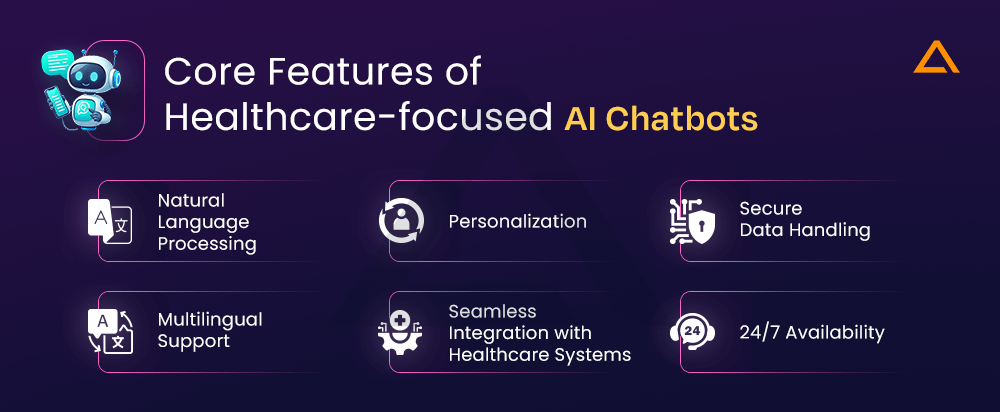
Natural Language Processing (NLP)
NLP enables the chatbot to understand and respond to human language effectively. In healthcare, the chatbot must be able to comprehend medical terminology, patient concerns, and context-specific queries to provide accurate responses. NLP ensures that the chatbot can handle a variety of patient interactions, from symptom-checking to appointment booking.
Personalization
A healthcare chatbot should provide personalized experiences for each user. This could include personalized health advice, reminders for medication, and tailored responses based on the patient’s medical history or specific health conditions. Integrating the chatbot with electronic health records (EHRs) can improve personalization by enabling it to offer more relevant and accurate responses.
Secure Data Handling
Data privacy and security are paramount in healthcare. Chatbots must adhere to stringent regulations such as the Health Insurance Portability and Accountability Act (HIPAA) to ensure that patient information is secure. The chatbot should use encryption and comply with privacy standards to protect sensitive medical information.
Multilingual Support
For healthcare systems that cater to a diverse population, multilingual support is essential. Chatbots with multilingual capabilities can interact with patients in their preferred language, enhancing the user experience and improving accessibility for non-native speakers.
Seamless Integration with Healthcare Systems
A healthcare chatbot should seamlessly integrate with existing healthcare platforms, such as electronic health records (EHR), patient management systems, and appointment scheduling systems. This integration allows chatbots to provide up-to-date information, such as available appointment slots or lab results.
24/7 Availability
One of the primary advantages of AI chatbots is their ability to provide round-the-clock support. Patients can reach out for assistance at any time, whether it’s for simple inquiries, symptom-checking, or general healthcare advice. This can alleviate pressure on healthcare providers and improve patient satisfaction.
Key Applications of AI Chatbots in Healthcare
AI chatbots have a wide range of applications across the healthcare sector, enabling healthcare providers to streamline operations and enhance patient care.
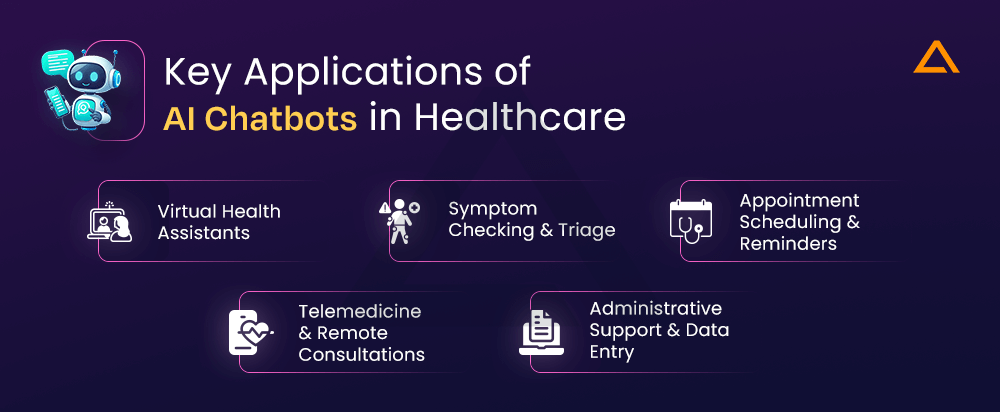
Virtual Health Assistants
AI-powered chatbots can act as virtual health assistants, providing patients with accurate health information, medication reminders, and lifestyle suggestions. These assistants can answer frequently asked questions, guide patients through post-surgery care, and even monitor chronic conditions like diabetes, hypertension, and asthma by tracking daily habits and providing advice based on the data collected.
Symptom Checking and Triage
Chatbots are increasingly being used for symptom checking, where patients input their symptoms, and the chatbot evaluates the potential causes based on an extensive database of medical knowledge. The chatbot can then provide recommendations such as visiting a doctor, taking over-the-counter medication, or scheduling a telehealth consultation. This triage process helps prioritize cases, ensuring that urgent issues are flagged for immediate attention.
Appointment Scheduling and Reminders
AI chatbots can simplify the process of scheduling medical appointments by allowing patients to book, cancel, or reschedule appointments directly through the chatbot interface. In addition to booking, chatbots can send reminders to patients about upcoming appointments or even prompt them for pre-appointment preparations.
Telemedicine and Remote Consultations
With the rise of telemedicine, chatbots can play a crucial role in facilitating remote consultations. The chatbot can collect initial patient data, perform symptom checks, and provide the necessary information to the healthcare provider, streamlining the telehealth process. In some cases, the chatbot may also offer video consultations, providing patients with immediate access to healthcare professionals.
Administrative Support and Data Entry
AI chatbots can automate administrative tasks such as patient registration, billing inquiries, insurance claims, and handling medical records. By automating these processes, healthcare organizations can reduce the workload of staff, minimize errors, and enhance operational efficiency.
Benefits of AI Chatbots in Healthcare
The implementation of AI-powered chatbots in healthcare brings numerous benefits to both patients and healthcare organizations.
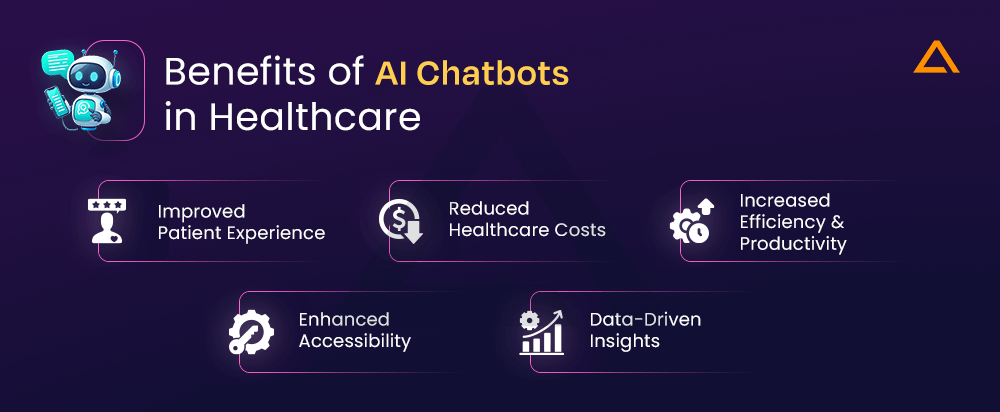
Improved Patient Experience
AI chatbots enhance the patient experience by providing instant, accessible, and personalized support. Patients can access information and schedule appointments at any time, reducing wait times and improving satisfaction. Moreover, chatbots are able to engage with patients in a conversational manner, making the interaction feel more human and less transactional.
Reduced Healthcare Costs
By automating routine tasks, AI chatbots can significantly reduce operational costs. They can handle a large volume of queries without requiring human intervention, reducing the need for additional administrative staff and allowing healthcare providers to allocate resources more effectively.
Increased Efficiency and Productivity
AI chatbots help streamline workflows and optimize resource utilization. By assisting with tasks like scheduling, triage, and administrative support, chatbots free up healthcare professionals to focus on more complex, high-priority tasks, improving overall efficiency and productivity.
Enhanced Accessibility
AI chatbots make healthcare services more accessible, particularly in underserved or remote areas where healthcare providers may be scarce. Patients can interact with a chatbot at any time, reducing the barriers to care and improving health equity.
Data-Driven Insights
Chatbots collect valuable data during interactions with patients, which can be analyzed to identify trends, patient needs, and gaps in care. This data can be used by healthcare providers to make informed decisions, improve services, and identify areas for improvement.

Looking for Chatbot Development Company?
Elevate Your Business with Customized AI Chatbot Solutions.
Challenges in Implementing AI Chatbots in Healthcare
Despite the clear benefits, several challenges remain in the widespread adoption of AI chatbots in healthcare.
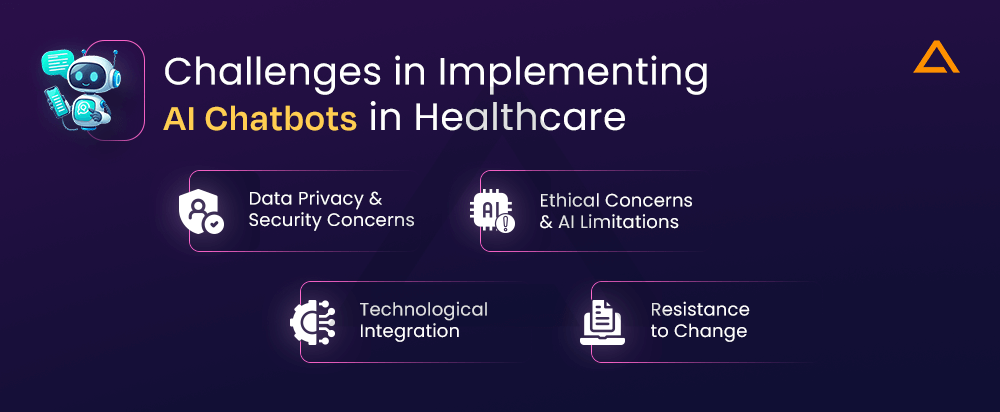
Data Privacy and Security Concerns
Healthcare chatbots must adhere to strict privacy regulations like HIPAA in the U.S., GDPR in Europe, and other regional data protection laws. Ensuring the chatbot platform’s compliance with these regulations and safeguarding patient data from breaches is crucial.
Ethical Concerns and AI Limitations
AI chatbots are powerful tools, but they are not infallible. There are concerns about the ethical implications of relying on AI for healthcare decisions, particularly in critical situations. It is essential that AI systems be designed with robust oversight and decision-making boundaries to prevent them from making medical decisions that require human judgment.
Technological Integration
Integrating AI chatbots into existing healthcare infrastructures can be complex, especially for legacy systems. Compatibility issues and technical barriers can make it difficult to implement a seamless AI solution, requiring investment in infrastructure upgrades and training for healthcare staff.
Resistance to Change
Healthcare professionals and patients may be resistant to adopting new technologies, especially if they are unfamiliar with AI or worried about its reliability. Overcoming this resistance involves educating stakeholders about the benefits of AI chatbots and ensuring they are user-friendly and intuitive.
Also Read: Digital Transformation in Healthcare
Future of AI Chatbots in Healthcare
The future of AI chatbots in healthcare looks promising, with continuous advancements in AI, machine learning, and NLP. Some trends that may shape the future of healthcare chatbots include:

- Increased Personalization: Future chatbots will be more adept at providing personalized care recommendations, tailored health plans, and even mental health support.
- Enhanced AI-Healthcare Integration: As AI continues to evolve, chatbots will become even more integrated into healthcare systems, providing more in-depth support for both patients and medical professionals.
- Predictive Capabilities: AI chatbots will not only respond to symptoms but predict potential health issues based on patient history and trends, providing proactive care.
Wrapping Up!
AI-powered chatbots are set to redefine healthcare by improving patient experiences, optimizing administrative processes, and enhancing operational efficiency. While challenges exist, the potential benefits of AI chatbots are immense.
By carefully designing and implementing these solutions, healthcare providers can improve care delivery, reduce costs, and enhance overall patient satisfaction. As technology continues to evolve, AI chatbots will play an even larger role in the future of healthcare, transforming the way healthcare services are delivered and experienced.
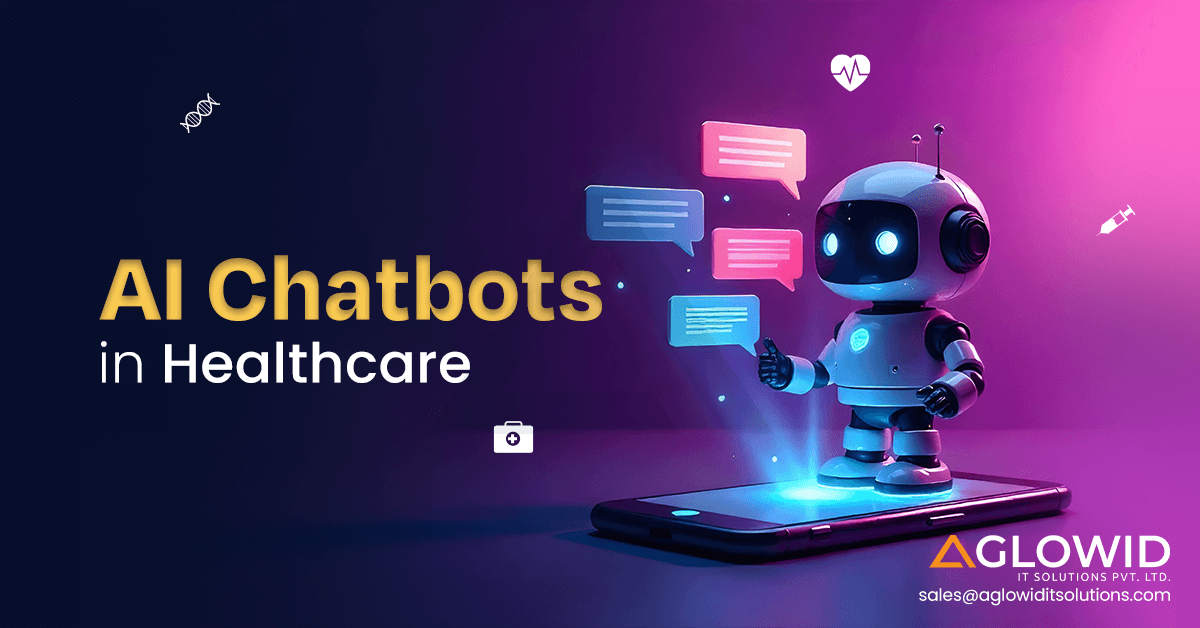

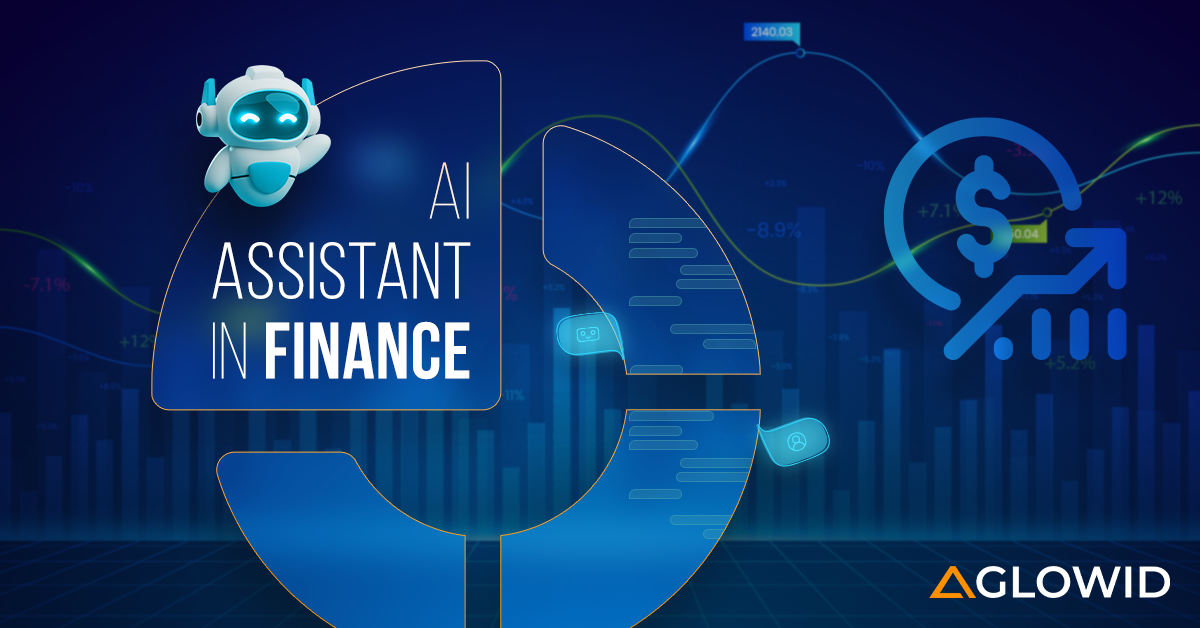
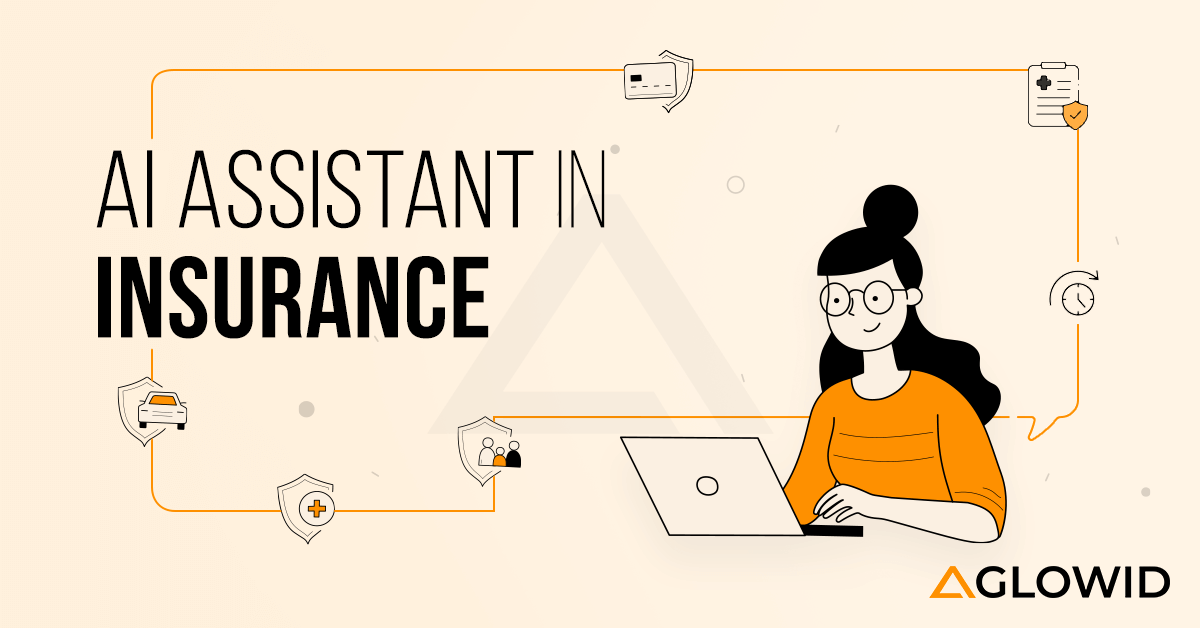

 Say
Say